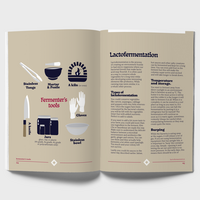Microbes are cool


The microbrewery scene in Quebec was particularly exciting in 2016-2019. I was made aware of different tastes that were totally new to me and sparkling with some sort of energy I couldn’t pinpoint. ‘D’la bibitte’ my brewer friend said.
Bibitte is a french Québécois slang that could be translated to critters or insects, somewhere between the two. What he meant is that these sour beers were alive, currently bubbling in our glasses filled with tiny monsters that would keep changing the brew’s taste over time. Saccharomyces and brettanomyces yeasts’ constant work imbued the beers with flavors that I could only describe as ‘farm-like’. Weird yet alluring to me.
I then got into fermentation for the next years. Learning that this type of food preservation is a mostly-forgotten trick of the past, with refrigeration helping us on that front. By making these techniques obsolete we have also let go many different, interesting tastes as well as benefits we should be looking at again. It is obviously still used in commercial food processing : cheese, tofu, tempeh, soya and alcohol are part of our lives, but the ancestral techniques used for home preservation to me, was long gone.
This didn’t keep me from experimenting and eventually launching my own fermented hot sauce brand. Which was quite short-lived. I couldn’t stop the fermentation once inside bottles and some have erupted as high-capsaicin volcanos that haver either narrowly missed some eyes or redecorated kitchen walls. (At that time I thought fermenting hot sauces for 2 weeks was enough to digest all the sugars inside the sauces, but alas, I now know that somewhere between 50-90 days is better, if you’re to encapsulate them, devoid of oxygen and filling slowly with ejected gas from the slow consumption of sugars. This may be why sometimes craft beers or ciders explode in your hands when you open them.)
Yet, this process still invigorates me to this day. I love stories of bread yeast surviving many generations in France, passed down through the family with great care. That somehow alongside these people were also many generations of bacteria working hard at sustaining an environment made to create amazing, tasty bread.
I love that it is so alien to modern life, where we are used to ‘kills 99.9% of all germs’, that antibacterial this and thats are found everywhere. That it looks horrible and mutated, while we throw away ugly looking fruit for beautiful looking ones. It certainly does not have much space to grow as an idea in modern society. So let’s throw it fantasy.
I’m not sure for you, but at the tables I’ve played at, food management wasn’t much of a bother, with good reason. Most games I play we go straight into the action or the roleplay, and most of the times we forget about how many rations we have, when we eat them, etc. It’s a layer of gameplay that my tables usually don’t care about.
In 5th edition (and certainly other systems), eating is a basic necessity that provides no actual gameplay choices, except maybe for the lucky within you who are doing hunting campaigns (which sounds like a lot fun). I was pondering about the implications of fermenting things in a game of Dungeons & Dragons. What would that mean? What would it create? What about magic?
If a couple of people at a table are looking at a player talking about fermenting some plants, would that be boring? What if that beer can grant temporary boons due to its awesome probiotic benefits? With this new beer, maybe a party could try and make a business out of it, always looking for new ingredients across the world.
What if some of these ingredients were magical in nature, what would that mean in a ferment? What could come of it? How would others in the world feel about these, would you be perceived as toying with nature?
There are so many relevant and fun ideas that a table could take from the simple idea of fermenting that I decided to write a zine about it.
In an effort to make things that matter to me and hopefully may matter to you, Microbia is a journey into ideas and possibilities, hooks and dangers you could use in your tabletop session.
Thanks for reading the origin of this endeavor.
Files
Get Microbia
Microbia
A guide to using fermentation in your ttrpg games!
| Status | Released |
| Category | Physical game |
| Author | Invisible Cuts |
| Genre | Educational |
| Tags | 5e, dnd, Dungeons & Dragons, Fantasy, fermentation, how-to, microbes, roleplaying-game, Tabletop role-playing game |


Leave a comment
Log in with itch.io to leave a comment.